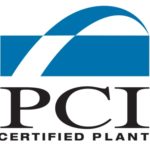1. How many pieces/pours to do usually get from a mold?
The quantity of pieces can vary depending on the complexity of the mold and material from which it is made. Typically with a wood mold you may get as many as 30 pieces from a mold, again depending on the complexity this number may vary. Steel molds while they require a larger initial investment produce a substantially higher number or pieces.
2. How many times should a panel be repeated in the buildings design?
Repetition is the key to Precast’s economy. Pieces should be repeated as many times as possible to minimize the mold’s expense.
3. How is a building panelized?
Panelization varies depending on the project requirements. Variables include the Precaster’s casting area, shipping restraints, and crane capacity. Also, the building’s frame spacing and location of windows and other features must be considered. Contact Sidley early in the planning stage and we will help you through these variables to design a solution that works best for your project.
4. What is the maximum size a precast piece should be for economical transportation?
Depending on the panel application, legal load size and floor members maximum recommended piece size may vary. As a rule though, the maximum size is ± 12-feet x 60-feet. Contact Sidley early in the planning stage and we will help you through these variables to design a solution that works best for your project.
5. What is the distance you will deliver precast components?
The most economical delivery area is a 250-300 mile radius from our plants. We deliver beyond this radius but the final prices will include additional delivery fees.
6. Do you erect only your own precast components?
At Sidley we only erect our own precast components ensuring the overall quality of the structure.
7. Do you offer a warranty, what are the terms?
The Sidley Precast Group warranties our products for one (1) year from delivery.
8 What is your lead time?
Lead times may vary depending on our current work load and the product type specified. Contact Sidley early in your planning stage to discuss delivery requirements to meet your project’s schedule.
9. What is the thickness of your wall panels?
The thickness of wall panels vary depending on the application, if they are to be insulated or non-insulated, load bearing or non-load bearing, and the height of the structure and depth of design details such as reveals. A typical non-load bearing, non-insulated panel would be 6-inches thick.
10. Can your wall panels be load bearing?
Wall panels can be designed to be load bearing. With a Total Precast System, walls are load bearing to support the floor and/or roof structure. In many instances the precast panels and their connections can be designed to help develop moment frame support for the building’s wind load requirements.
11. What is the R-value of a wall panel?
Depending on the project requirements R-values can be designed for ratings of R5 to R39. Thickness of panel will increase depending on the specifications.
12. What is the strength of the concrete?
Concrete can be designed for strengths of 5,000 PSI to +12,000 PSI depending on the application of the precast components.
13. How are the joints sealed and weather-proofed? How long does it last?
All joints are sealed using a backer rod or bond breaker tape and caulked on either side. The caulking should be inspected annually and has a typical life of 5-7 years.
14. Can an existing precast finish be matched?
Yes, provided the mixtures components are still available including cement and aggregates. If the original mixture components are not readily available, custom mixes can be designed to closely match the original.
15. What are the advantages to thin-faced brick precast panel vs. traditional brick construction?
Shorter construction times are possible with thin-faced brick precast panels due to all weather construction or any skilled labor shortages of masons. Brick-faced precast panels improve buildability because there is no need for scaffolding, winter enclosure and heating of the structure. The job site is also cleaner and precast does not bring unwanted waste to the job site.
16. Who engineers/designs the precast connections?
The Precaster will design all the precast connections, the architect need only indicate their connection intent and loading for the building. If required, the Precaster’s engineer can stamp the drawings provided.
17. What LEED points can be earned with precast?
Precast helps earn critical LEED points in several categories including Sustainable Sites, Energy & Atmosphere, Materials & Resources, Indoor Environmental Quality and Innovation & Design Process. Precast’s attributes that help earn these point comes from its thermal mass, off-site manufacturing, recycled and recyclable content among others. Contact Sidley early in your planning stage to help design a structure that will maximize Precasts benefits for LEED.
18. Why should I specify a PCI certified Precaster?
Precast/Prestressed Concrete Institute [PCI] Certification ensures you are receiving a quality product from a reputable precast manufacturer that has passed PCI’s rigorous audit and certification process. PCI Certified Plants must undergo at least two (2) unannounced, 120-point audit each year for every product manufactured. Audits are conducted by a certified team of specially trained engineers from an independent consulting engineering firm. PCI Certification also requires mandatory compliance to nationally recognized standards.
PCI also has Field Certification for erection crews that must pass performance test criteria to determine their compliance with design requirements. Quality Control Personnel Certification Program must also be in place for producer members, that addresses technical details of producing prestressed concrete.
More government agencies, states and municipalities are requiring PCI Certification for Precasters along with the AIA/Masterspec Program.
19. When should I contact Sidley to discuss my project?
We recommend that you contact us early in the planning stage so we may assist you with sizes, connections, schedules and aesthetics, as well as samples and budget pricing support. Please feel free to call us at 800.536.3232 or info@sidleyprecast.com.


